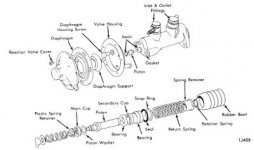Chet Zerlin
Jedi Trainee
Offline
Hello all,
Today while driving on I-75 I went through a rather lengthy period of bumper-to-bumper traffic due to an accident. I noticed no braking issues until the traffic cleared up and I started to accelerate at which point the car seemed to have no power. However when I did a one-time pump on the brake pedal it must have released something in the braking system because everything went back to normal. It happened again a little later when I braked for the exit but another pump on the brake pedal cleared it up again.
Anyone ever had a similar situation happen to them? Any suggestions from the good people on this forum as to what I might need to check first?
Thanks!
Chet
Today while driving on I-75 I went through a rather lengthy period of bumper-to-bumper traffic due to an accident. I noticed no braking issues until the traffic cleared up and I started to accelerate at which point the car seemed to have no power. However when I did a one-time pump on the brake pedal it must have released something in the braking system because everything went back to normal. It happened again a little later when I braked for the exit but another pump on the brake pedal cleared it up again.
Anyone ever had a similar situation happen to them? Any suggestions from the good people on this forum as to what I might need to check first?
Thanks!
Chet

 Hi Guest!
Hi Guest!

 smilie in place of the real @
smilie in place of the real @
 Pretty Please - add it to our Events forum(s) and add to the calendar! >>
Pretty Please - add it to our Events forum(s) and add to the calendar! >> 
